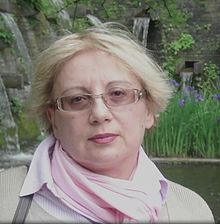Leyla Yunus
Leyla Islam qizi Yunusova (born Leyla Islam qizi Vəliyeva , born December 21, 1955 in Baku ), better known as Leyla Yunus , is an Azerbaijani human rights activist and since 1995 director of the human rights organization "Institute of Peace and Democracy". She is particularly known for her commitment to those people who have been affected by the evictions in Baku that have been taking place since 2008.
Career
In the late 1980s, Yunus was active in reformist circles in what was then the Soviet Union . In 1988, together with a small group of moderate intellectuals, she founded the “Azerbaijani Popular Front in Support of Perestroika ”, a predecessor organization of the Azerbaijani Popular Front .
In January 1990, Yunus founded the Social Democratic Party together with Zardusht Alizadeh , with the aim of bringing a moderate voice into political life in Azerbaijan. In April 1990, Yunus published an essay The Responsibilities of a Politician, which advocated a moderate course away from extreme nationalism and the tyranny of the Soviet Union.
During the Nagorno-Karabakh conflict between 1992 and 1993, Yunus was Azerbaijan's Deputy Minister of Defense. Then she began to call for peace between Azerbaijan and Armenia together with socially committed activists . Together with her husband Arif, she is actively committed to reconciliation with the Armenians.
In 2009 she was sued by Azerbaijani Interior Minister Ramil Usubov for defamation for publicly criticizing the police's behavior during the kidnapping of two young girls and for helping the smugglers of the two kidnapped girls. Organizations such as Human Rights Watch then called on the Azerbaijani government to drop the charges.
Subsequently, she repeatedly criticized the behavior of the police during the evictions in the old town of Baku and in 2011 threatened to bring the cases of expropriation to the European Court of Human Rights . On August 11, 2011, Yunus' office in Baku was demolished after the authorities announced the demolition minutes earlier. Yunus himself was in Norway at the time . Representatives of the European Union condemned the leveling of the office and stressed the importance of Yunus' institute's partnership with the international community. The action was also condemned in a joint letter by 52 human rights organizations from 14 countries.
Together with Rasul Jafarov , Yunus founded a working group in 2014 to compile a list of political prisoners in Azerbaijan. Both were arrested that same year and were also on the list released by the Norwegian Helsinki Committee in August 2014 . The background to the arrest of Yunus and her husband Arif Yunus in April 2014 at Baku Airport was the allegation by the Azerbaijani government that Yunus was spying for Armenia. The detention of Yunus and her poor health due to the lack of medical care in the prison sparked protests by the Parliamentary Assembly of the Council of Europe , Reporters Without Borders and other non-governmental organizations (NGOs).
On August 13, 2015, Yunus was sentenced to eight and a half years in prison for fraud, tax evasion, and other alleged offenses, and her husband to seven years. Western governments and NGOs are again protesting against the persecution of activists like Leyla Yunus. On December 9th of the same year, Yunus was released from prison on health grounds and the unconditional sentence was converted into a conditional sentence.
Awards
In 2013 Yunus received the Theodor Haecker Prize from the city of Esslingen am Neckar , and in 2014 she received the Sergio Vieira de Mello Prize awarded in Poland . Yunus was awarded the Sakharov Freedom Prize in October 2014 . In the same month she was one of the three finalists for the Sakharov Prize . In the course of the nomination, the European Parliament announced that it would send a delegation to Azerbaijan to support them in their efforts for democracy and freedom in their country.
swell
- ^ Offices of Activist Bulldozed in Azerbaijan , New York Times article , Aug. 12, 2011
- ^ A b Thomas De Waal: Black Garden: Armenia and Azerbaijan Through Peace and War . NYU Press, New York 2003, ISBN 978-0814719442 , pp. 83-84.
- ^ The Responsibility of a Politician: Leyla Yunus and the Heirs of Andrei Sakharov . October 11, 2014. Retrieved October 21, 2014.
- ↑ Пакт стабильности в Закавказье , accessed on May 3, 2017
- ↑ Azerbaijan's Leyla Yunus, human rights defender, held , BBC article , April 29, 2014
- ↑ HRW Urges Azerbaijan To Drop Libel Case Against Rights Activist , article by Radio Free Europe from January 21, 2009
- ^ Offices of Activist Bulldozed in Azerbaijan , New York Times article , Aug. 12, 2011
- ↑ Condemning the demolishion of HR defender Leyla Yunus house in Baku , article on humanrightshouse.org, accessed on May 5, 2017
- ↑ List ( memento of the original from October 21, 2016 in the Internet Archive ) Info: The archive link was inserted automatically and has not yet been checked. Please check the original and archive link according to the instructions and then remove this notice. of political prisoners in Azerbaijan, August 10, 2014, accessed on May 5, 2017
- ↑ Azerbaijan's Leyla Yunus, human rights defender, held , BBC article , April 29, 2014
- ↑ Azerbaijan criticized for jailing activist couple , Guardian article , Aug. 13, 2015
- ↑ Denis Mukwege: winner of Sakharov Prize 2014 , article on the website of the European Parliament from October 21, 2014
| personal data | |
|---|---|
| SURNAME | Yunus, Leyla |
| ALTERNATIVE NAMES | Yunusova, Leyla Islam qizi |
| BRIEF DESCRIPTION | Azerbaijani human rights activist and politician |
| DATE OF BIRTH | December 21, 1955 |
| PLACE OF BIRTH | Baku , Azerbaijani SSR |
